

Helping Our Kids Become Humanists. By Philip E.

Johnson The classic approach to learning, worldwide and since the beginning of education, has been the general idea of the transfer of information. The younger generation needs to know the facts—everything from how to sharpen a spear point to the multiplication tables to the history of the Civil War. There’s nothing wrong with it–it’s necessary and useful–but increasingly we are realizing that it is not the whole story. First, the world is changing so fast that dramatic change is intra-generational. The Humanist as a Teacher. Humanistic education. Humanistic education (also called person-centered education) is an approach to education based on the work of humanistic psychologists, most notably Abraham Maslow and Carl Rogers.[1][2] Carl Rogers has been called[by whom?]
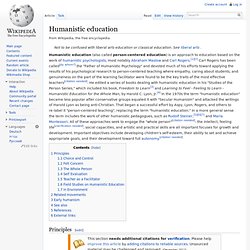
The "Father of Humanistic Psychology" and devoted much of his efforts toward applying the results of his psychological research to person-centered teaching where empathy, caring about students, and genuineness on the part of the learning facilitator were found to be the key traits of the most effective teachers[citation needed]. He edited a series of books dealing with humanistic education in his "Studies of the Person Series," which included his book, Freedom to Learn[3] and Learning to Feel - Feeling to Learn - Humanistic Education for the Whole Man, by Harold C. Principles[edit] Choice and Control[edit] The humanistic approach places a great deal of emphasis on students' choice and control over the course of their education.
Felt Concern[edit] Self Evaluation[edit] What are similarites between behaviorism and humanism. Behaviorism is primarily concerned with the concepts of stimulus and response and conditioning.

For example, whenever I sit down in my recliner, my dog gets excited and runs in a circle around it. That's because I often play fetch with him while sitting in the chair. So the stimulus is the chair, the response is him running in a circle. InSITE08p219-230Motah478. Humanistic Perspective 2.0.doc. A_Humanistic-Existential_Approach_to_Strategy_-_Daniel_Burger. Teaching Soft Skills Makes Eight Sigma Success - College Essay - Gwutrwgp164. Teaching Soft Skills Makes for Eight Sigma Success Ms.
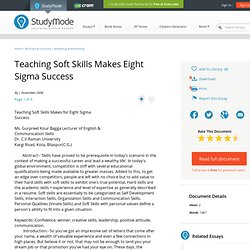
Gurpreet Kour Bagga Lecturer of English & Communication Skills Dr. C.V.Raman University Kargi Road, Kota, Bilaspur(C.G.) Abstract:- ‘Skills have proved to be prerequisite in today's scenario in the context of making a successful career and lead a wealthy life’. In today's global environment, competition is stiff with several educational qualifications being made available to greater masses. Keywords:-Confidence, winner, creative skills, leadership, positive attitude, communication. Our soft skills help us serve others better - Smart_Company. By LUCY KIRUTHU Occasionally, people want to find out if I train on soft skills.
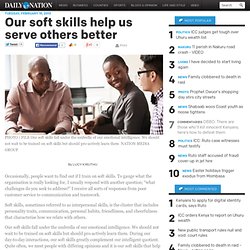
To gauge what the organisation is really looking for, I usually respond with another question; “what challenges do you seek to address?” I receive all sorts of responses from poor customer service to communication and teamwork. Soft skills, sometimes referred to as interpersonal skills, is the cluster that includes personality traits, communication, personal habits, friendliness, and cheerfulness that characterise how we relate with others. Emotional Intelligence – The Hard Truth About Soft Skills. According to an article published in CIO magazine, the primary cause of leadership failure in technical organizations is poor interpersonal skills.
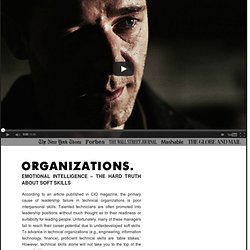
Talented technicians are often promoted into leadership positions without much thought as to their readiness or suitability for leading people. Unfortunately, many of these managers fail to reach their career potential due to underdeveloped soft skills. To advance in technical organizations (e.g., engineering, information technology, finance), proficient technical skills are ‘table stakes.’ However, technical skills alone will not take you to the top of the career ladder. Emotional Intelligence The highest performing leaders possess Emotional Intelligence, a term popularized by Daniel Goleman in his book of the same name. Steps to Increase EQ The assessment delivers the first step, which is awareness.
Soft Skills and Emotional Intelligence. Emotional Intelligence and Leadership: Why the soft skills matter. The last few decades have witnessed a continuous growth in interest in the area of leadership, with both managers and leadership researchers searching to identify those behaviours that increase a leader’s effectiveness.
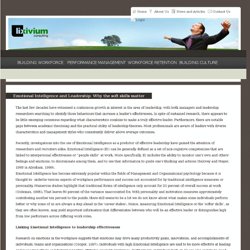
In spite of sustained research, there appears to be little emerging consensus regarding what characteristics combine to make a truly effective leader. Furthermore, there are notable gaps between academic theorising and the practical utility of leadership theories. Most professionals are aware of leaders with diverse characteristics and management styles who consistently deliver above average outcomes. Recently, investigations into the use of Emotional Intelligence as a predictor of effective leadership have gained the attention of researchers and recruiters alike. Employability Soft Skills. No matter how difficult the academic program, many do not emphasize the need for students to develop their soft skills.
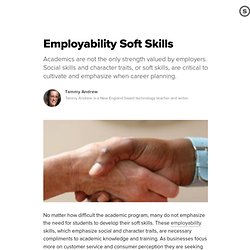
These employability skills, which emphasize social and character traits, are necessary compliments to academic knowledge and training. As businesses focus more on customer service and consumer perception they are seeking employees who can add to the overall perception that the business values human needs. What are Soft Skills? Soft skills are also referred to as Emotional Intelligence, social skills or character traits. Why paper qualifications are no longer enough - News. Last Updated:27 January, 2012Section:News In an increasingly competitive market for jobs and higher courses of study, all-round achievement rather than mere attainment is at a premium Adecade or so ago, teachers could bid farewell to their senior pupils, knowing that a solid set of Standard grades and Highers would get them into the college or university - or even job - of their choice.

Soft skills save hard cash. 22 November 2012 | By Sir Merrick Cockell Across our three boroughs there are more than 4,700 young people out of work.

LGC keeps you up to date with the latest news and developments in local government, giving you all the information and tools you need to work more effectively Never miss the latest news in local government Online and mobile access to the latest news as it happens plus newsletters and the weekly magazine Keep up with the conversation Opinion from leading figures in local government Lead change Get the information required to make positive changes through briefings, insight and inspiration from LGC’s panel of experts SUBSCRIBE today It takes two minutes to do and you’ll immediately have full access to lgcplus.com, plus the LGC magazine delivered every week. 'Soft skills' seen as key to employability. Most business leaders believe that Europe's young people lack the so-called 'soft skills' that are considered essential by many employers. Soft skills and employability : evidence from UK retail - Strathprints. Nickson, D.P. and Warhurst, C. and Commander, J. and Hurrell, S.A. and Cullen, A.M. (2012) Soft skills and employability : evidence from UK retail.
Economic and Industrial Democracy, 33 (1). pp. 65-84. ISSN 0143-831X Full text not available in this repository. (Request a copy from the Strathclyde author) Maslow and Rogers: Growth and Actualization « Organizational Psychology. Well-know psychologists and theorists Abraham Maslow and Carl Rogers shared the belief that, given the right conditions, people are self-directed in seeking growth and actualization. Their theories can help shed some light on what motivates people at work. Maslow’s theory suggests that people will seek higher, more intrinsic goals once their basic physical and psychological needs are met (Feist & Feist, 2009, 304). Roger’s theory suggests that under favorable conditions, people will become more self-aware, self-directed, congruent, and trustworthy (Feist & Feist, 2009, 339). This post will explore the theories of Maslow and Rogers as they relate to workplace motivation, as well as the idea that getting our needs met at work is critical to productivity and satisfaction.
Maslow’s hierarchy of needs categorized human needs into levels (a stair-step metaphor is often used) that help people grow toward self-actualization. References:Chamorro-Premuzic, T. (2011). 2nd Edition. Soft Skills are Valued Necessities Essay. Organizations have guidelines on skills that they need their employees to have. There are many organizations where the needs and desires strongly focus on the people skills that the employees have and how they use that skill to lead the organization to success.
Some organizations would consider soft skills or "touchy feely skills as ones that they do not require and their approach winds up having an organization that does not utilize people skills with their external and internal customers. An Overview of Soft Outcome. Dev._Indicators_of_Distant_Travelled_for_the_NSF. Reengagingfull. Leadershisoftskill. Technical Doc. Understanding Confidence and Motivation. Event_well-being_sarahfrost. 4619. Sample Questionnaire. “Soft” Skills and Race: Soft%20Skills%20in%20Big%20Demand.
Guide to Measuring Soft Outcomes and Distance Travelled. Dewson S, Eccles J, Tackey N D, Jackson A Department for Education and Skills, February 2001 ISBN: (no ISBN), pp. 24 Bound copy: £free a report researched by IES This is a free guide. A%20Practical%20Guide%20to%20Measuring%20Soft%20Outcomes%20and%20Distance%20Travelled%20-%20Guidance%20Document%202003. Measuring Soft Outcomes and Distance Travelled: A Review of Current Practice - Brief. Monitoring systems for employment programmes which are targeting unemployed people have traditionally focused on 'hard', quantitative outcomes such as the numbers going into jobs or the numbers gaining qualifications. There is growing recognition that such measures taken in isolation are inadequate in demonstrating the success of a project as a whole.
In addition, these 'hard' measures of success do not give a complete picture of a client’s increased employability. The Institute for Employment Studies were commissioned to look at the use of 'soft', qualitative outcomes on projects funded by the European Social Fund. Guide to Measuring. Rs8706. T & F Online. SOULJune04. Untitled. Toolkit. Angus College gets tough with its innovative soft skills course - Further Education. Last Updated:12 February, 2010Section:Further Education Transnational venture gets under way, helping teenagers to show they’ve got the right attitude It’s the quality most sought after by teachers and employers everywhere - a good attitude. Soft Outcomes.